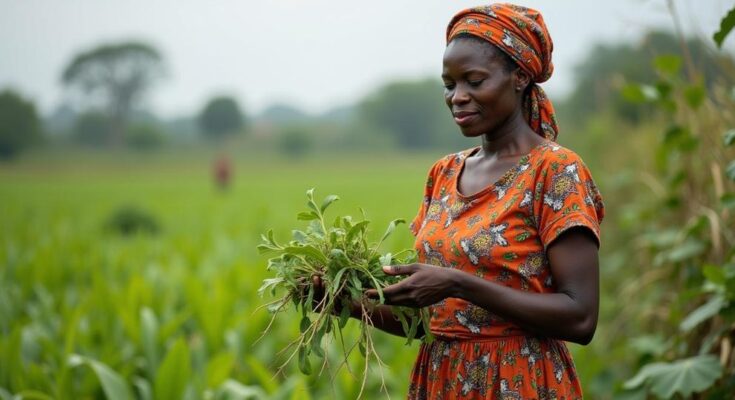Women farmers in Ghana, constituting about 70% of the agricultural workforce, utilize sustainable practices that combat climate change while advocating for necessary reforms in the agricultural sector. They face unique challenges due to climate change and emphasize the importance of gender equality in leadership roles within climate adaptation initiatives.
In Ghana, women represent approximately 70 percent of the agricultural and related workforce, predominantly as smallholder farmers who embrace ecological and organic practices. These sustainable methods limit the use of synthetic chemicals and external inputs, thereby fostering environmental preservation. Despite operating with constrained resources, women farmers play a critical role in biodiversity conservation and the mitigation of greenhouse gas emissions, given their reliance on natural resources for sustenance. Unifying under a broader social movement, Ghanaian women farmers are advocating vigorously for transformative reforms within the agricultural sector aimed at diminishing carbon emissions. They urge the government to take decisive climate action and emphasize the necessity of integrating agro-ecology into the nation’s climate response strategies. Awula Serwah, a distinguished Ghanaian environmentalist and coordinator of Eco-Conscious Citizens Ghana, articulates the distinctive challenges that climate change and environmental degradation pose to women and girls. “Climate change and environmental degradation affect everyone. They are not respecter of persons. In communities where women and girls are responsible for food production, fetching water and fetching fuel for cooking, it is especially challenging for them,” remarked Ms. Serwah. She stresses the urgency of change and the importance of collective responsibility in mitigating environmental harm. On gender equality in the context of climate change, Ms. Serwah contends that leadership in climate adaptation should not be gender-restricted: “Anyone with a passion, an understanding of climate adaptation and the necessary skills and willingness to lead, should lead. It is crucial that we work towards gender equality but we shouldn’t make climate change a gender issue,” she emphasized, drawing attention to the legacy of Prof. Wangari Maathai, a Kenyan environmentalist and the first African woman to receive the Nobel Peace Prize for her contributions to environmental conservation. Ms. Serwah asserts that determined women can effectively lead climate adaptation efforts, highlighting that a woman’s capability is not defined by her gender but by her passion and commitment to the cause. She stresses the need for governments and policymakers to formulate inclusive strategies supporting women’s engagement in climate initiatives. “We all have a constitutional duty to protect the environment, and we should demand action,” she declared.
The agricultural sector in Ghana is predominantly operated by women, who are crucial to food production and natural resource management. These women often utilize sustainable agricultural practices that not only support their livelihoods but also contribute to environmental conservation. As climate change increasingly threatens agriculture and rural livelihoods, women farmers are organizing and influencing policy changes to protect their resources. Their unique perspectives and roles necessitate inclusion in climate action strategies, demonstrating the intersection of gender equality and effective climate responses.
In conclusion, women farmers in Ghana are at the forefront of combating climate change through sustainable practices that promote environmental conservation and biodiversity. Their advocacy for transformative agricultural reforms highlights the critical role of women in climate action and the need for inclusive strategies that empower them. The insights shared by leaders like Awula Serwah underscore the urgency of collective efforts and the importance of removing barriers to women’s leadership in environmental initiatives.
Original Source: www.un.org




